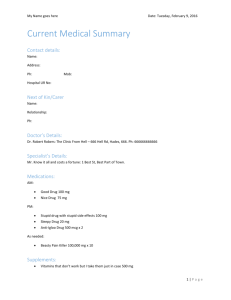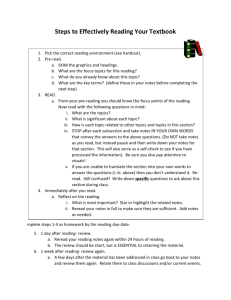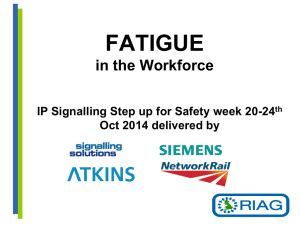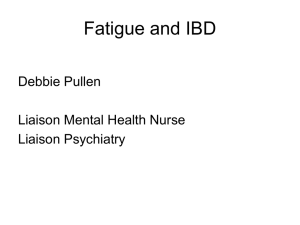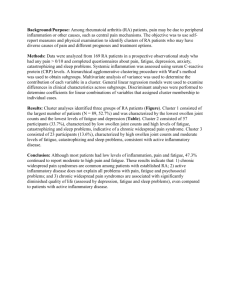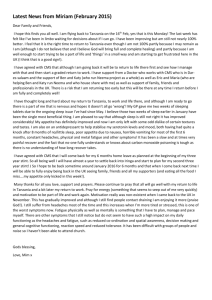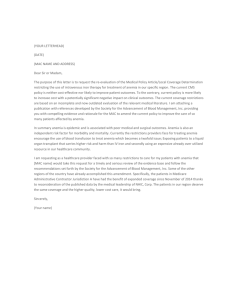When Being Tired Means More: 5 Possible Conditions
advertisement
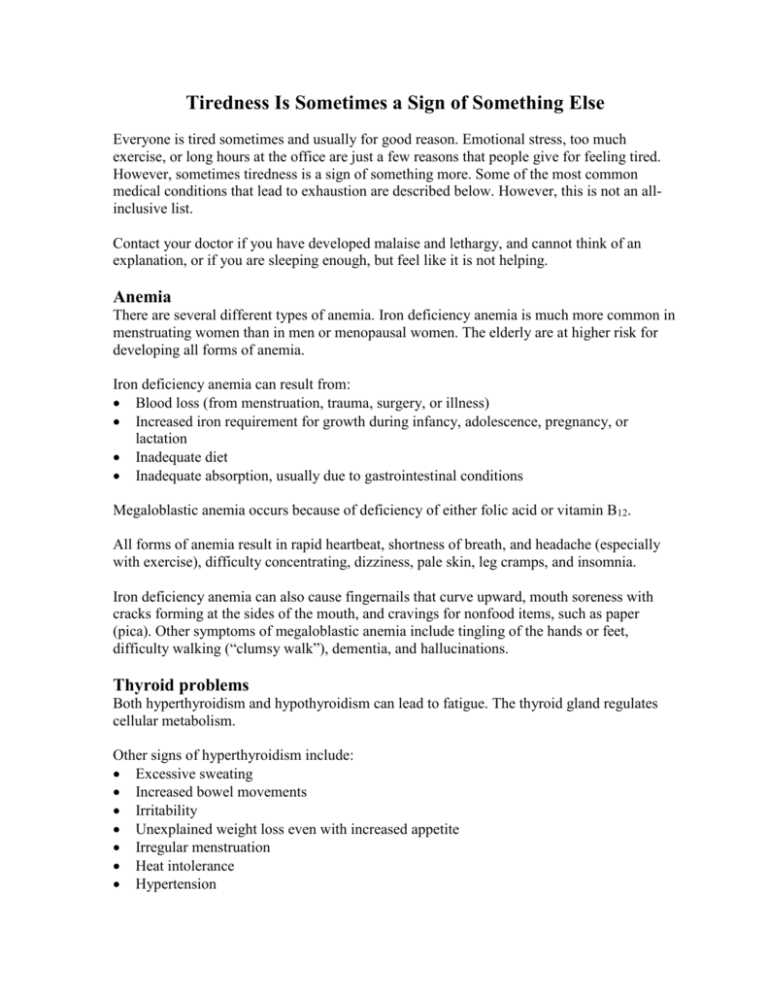
Tiredness Is Sometimes a Sign of Something Else Everyone is tired sometimes and usually for good reason. Emotional stress, too much exercise, or long hours at the office are just a few reasons that people give for feeling tired. However, sometimes tiredness is a sign of something more. Some of the most common medical conditions that lead to exhaustion are described below. However, this is not an allinclusive list. Contact your doctor if you have developed malaise and lethargy, and cannot think of an explanation, or if you are sleeping enough, but feel like it is not helping. Anemia There are several different types of anemia. Iron deficiency anemia is much more common in menstruating women than in men or menopausal women. The elderly are at higher risk for developing all forms of anemia. Iron deficiency anemia can result from: Blood loss (from menstruation, trauma, surgery, or illness) Increased iron requirement for growth during infancy, adolescence, pregnancy, or lactation Inadequate diet Inadequate absorption, usually due to gastrointestinal conditions Megaloblastic anemia occurs because of deficiency of either folic acid or vitamin B12. All forms of anemia result in rapid heartbeat, shortness of breath, and headache (especially with exercise), difficulty concentrating, dizziness, pale skin, leg cramps, and insomnia. Iron deficiency anemia can also cause fingernails that curve upward, mouth soreness with cracks forming at the sides of the mouth, and cravings for nonfood items, such as paper (pica). Other symptoms of megaloblastic anemia include tingling of the hands or feet, difficulty walking (“clumsy walk”), dementia, and hallucinations. Thyroid problems Both hyperthyroidism and hypothyroidism can lead to fatigue. The thyroid gland regulates cellular metabolism. Other signs of hyperthyroidism include: Excessive sweating Increased bowel movements Irritability Unexplained weight loss even with increased appetite Irregular menstruation Heat intolerance Hypertension Anxiety Severe hyperthyroidism can lead to “thyroid storm,” resulting in heart failure, hypertension, and fever. Other signs of hypothyroidism include: Weight gain Cold intolerance Pale and dry (sometimes scaly) skin Puffy face Irritability Coarse/dry hair Hoarse voice Elevated blood cholesterol Muscle aches Muscle stiffness Constipation Paresthesias of the hands and feet Menorrhagia Forgetfulness and/or confusion Constipation Prolonged hypothyroidism can lead to myxedema, which may result in slow breathing, decreased body temperature, low blood pressure, and coma. Chronic fatigue syndrome No one knows what causes this complex condition. The main symptom is unrelenting fatigue, lasting for 6 months, which does not improve with rest. The most commonly reported symptoms include: Impaired memory and concentration Sore throat Tenderness of the lymph nodes Muscle soreness Headaches Joint pain Exercise intolerance Sleep disturbances However, symptoms vary widely among patients. Other reported symptoms include: Irritable bowel syndrome (IBS) Frequent urination Weight loss Dizziness Dry eyes or mouth Cold hands and feet Rapid heart beat Frequent urination A diagnostic test for chronic fatigue syndrome does not exist. Diagnosis usually is made through exclusion, by ruling out all of the other possible causes for symptoms. Sleep apnea or other sleep disorders Many different sleep disorders exist. If you feel that you might have a sleep disorder, you should ask your doctor about having a sleep study performed. Two of the most common sleep disorders are narcolepsy and sleep apnea. Narcolepsy has different forms as well. A person with narcolepsy falls asleep during the day and during normal activity. Other symptoms may include: Excessive daytime sleepiness Loss of muscle control (cataplexy) Hallucinations Temporary feelings of paralysis Sleep apnea is when a person stops breathing for 10 seconds or more while sleeping. Symptoms of sleep apnea, besides daytime fatigue, include: Snoring Waking up with a sore or dry throat Forgetfulness Mood changes Decreased libido Abrupt awakening accompanied by gasping for air Morning headaches Fibromyalgia Similar to chronic fatigue syndrome, the symptoms of fibromyalgia vary widely among sufferers. The most common symptoms, besides exhaustion, include: Widespread and chronic pain Insomnia IBS Numbness and tingling Coordination problems Headaches Memory and concentration problems Psychological issues Fibromyalgia sufferers have flares and relapses, and often note that the weather and their level of stress impact symptoms. Diagnosis is based on the presence of tender points in all four quadrants of the body. Type 2 diabetes If you suspect that you may have developed diabetes, it is crucial to get tested immediately to avoid or limit the development of serious complications. Besides fatigue, people with type 2 diabetes often note that they have: Increased thirst and hunger Dry mouth Frequent urination Unexplained weight loss Blurred vision Headaches References and Recommended Readings Chronic fatigue syndrome—symptoms. WebMD website. http://www.webmd.com/chronicfatigue-syndrome/chronic-fatigue-syndrome-symptoms. Updated March 12, 2014. Accessed April 20, 2015. Fibromyalgia. Mayo Clinic website. http://www.mayoclinic.org/diseasesconditions/fibromyalgia/basics/definition/CON-20019243. Published February 20, 2014. Accessed April 20, 2015. Gluckman S. Chronic fatigue syndrome. Merck Manual Professional Version website. http://www.merckmanuals.com/professional/special_subjects/chronic_fatigue_syndrome/chronic _fatigue_syndrome.html?qt=chronic%20fatigue%20syndrome&alt=sh. Reviewed May, 2014. Accessed April 20, 2015. Hershman JM. Hyperthyroidism. Merck Manual Professional Version website. http://www.merckmanuals.com/professional/endocrine_and_metabolic_disorders/thyroid_disord ers/hyperthyroidism.html. Reviewed May, 2014. Accessed April 20, 2015. Hershman JM. Hypothyroidism. Merck Manual Professional Version website. http://www.merckmanuals.com/professional/endocrine_and_metabolic_disorders/thyroid_disord ers/hypothyroidism.html. Reviewed May, 2014. Accessed April 20, 2015. Narcolepsy. WebMD website. http://www.webmd.com/sleep-disorders/guide/narcolepsy. Reviewed August 28, 2014. Accessed April 20, 2015. Sleep apnea symptoms. WebMD website. http://www.webmd.com/sleep-disorders/sleepapnea/symptoms-of-sleep-apnea. Reviewed February 21, 2013. Accessed April 20, 2015. Stopler T, Weiner S. Medical nutrition therapy for anemia. In: Mahan LK, Escott-Stump S, Raymond JL. Krause’s Food and the Nutrition Care Process, 13th ed. St. Louis MO: Elsevier Saunders; 2012:725-741. Symptoms of type 2 diabetes. WebMD website. http://diabetes.webmd.com/guide/diabeteswarning-signs. Reviewed September 3, 2014. Accessed April 20, 2015. Understanding anemia—the basics. WebMD website. http://www.webmd.com/a-to-zguides/understanding-anemia-basics. Reviewed March 4, 2015. Accessed April 20, 2015. Contributed by: Elaine M. Hinzey, RD, LDN Updated by Nutrition411 Staff Review Date: 4/7/15 Key words for search engine: fatigue, tired
